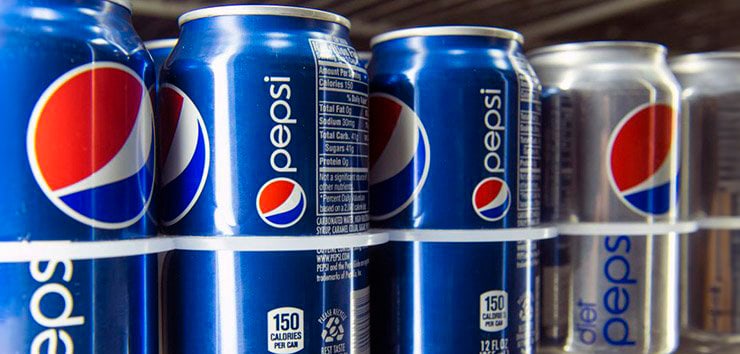Pepsi Removes Artificial Sweetener Aspartame From Diet Pepsi

Following the wave of corporations responding to consumer activism like never before, PepsiCo has announced that it will be removing the artificial sweetener aspartame from its Diet Pepsi product.
Beginning mid-August, 2015, Pepsi will start shipping aspartame-free Diet Pepsi to stores following plummeting diet soda sales – likely due to concerns that the artificial sweetener may be linked to health problems.
Senior vice president for PepsiCo said:
“It’s literally the number-one complaint we’ve heard from diet-cola consumers as to why they’re drinking less and less diet cola…”
The reformulated Diet Pepsi will contain sucralose and acesulfame potassium, which are ‘less controversial sweeteners.’ The front of the new Diet Pepsi can declares “Now Aspartame Free” and PepsiCo will continue to announce the change on in-store advertising trumpeting the company’s sponsorship of the National Football League.
The beverage maker will also remove all remaining aspartame-containing products from stores.

Aspartame – also known as Equal, NutraSweet, and Canderel – has been linked to a number of conditions in a wide variety of studies — some of which mega food scientists argue are unscientific.
Shifting to a Lesser Evil?
Replacing the aspartame in Diet Pepsi with sucralose and acesulfame potassium may not be a much healthier recourse, however.
When sucralose, or Splenda, was first introduced to the market, it was touted as a safe alternative to aspartame and saccharine because it is made from sugar. Indeed, sucralose starts out as sucrose, a type of sugar.
Sucralose is made by replacing three select hydrogen-oxygen groups on the sugar molecule with three chlorine atoms, resulting in an intensely sweet, no-calorie sweetener.
Translation: sucralose is chlorinated sugar.
Early research suggested that sucralose passed through the GI tract undigested, leaving your health unaffected. Recent research, however, shows that sucralose is actually metabolized and can cause health problems such as:
Reducing Good Gut Bacteria
Sucralose alters the amount and quality of the beneficial microbes living in the gut by 50% or more, leading to weight gain and obesity.
Reduces the Effectiveness of Meds
Sucralose limits the absorption of therapeutic drugs like cancer and heart disease medications, and makes them less effective.
Toxin Release when Baked
This fake sweetener decomposes when baked, which releases potentially toxic compounds known as chloroproanols.
May Alter the Body’s Responses
Splenda can alter insulin responses and blood sugar levels, both of which have been linked to inflammatory bowel disease, and may even alter genes.
Touching on Acesulfame Potassium (Ace-K)
As for acesulfame potassium or Ace-K (brand names Sunett or Sweet One), scientists have called for additional studies on the safety of the substance due to flaws in the initial testing of the sweetener. Methylene chloride is a carcinogenic chemical found in Ace-K.
Long-term exposure to methylene chloride has been linked to visual disturbances, headaches, depression, liver effects, nausea, mental confusion, kidney effects and cancers in humans.
Aspartame’s Interesting History
Instead, I’m going to bring you back to 1999. It was then that we learned the true origin of aspartame: genetically modified bacteria waste created by Monsanto. We wrote about this back in a October 2010 piece entitled ‘How is Aspartame Made? 1999 Investigation Finds Aspartame is Made with Genetically Modified Bacteria,’ but at the time there was very little interest on the subject of aspartame’s creation in the general public.
Recent Victories
In the past few months, we’ve seen McDonald’s announce that they will be reducing antibiotics in their livestock, Hershey chocolate company will begin phasing out high-fructose corn syrup, and now Pepsi is removing aspartame.
But is Pepsi’s move really beneficial for our health, or is it just all about the money?
Will you be buying Pepsi’s new Diet Pepsi with Splenda?

Gee whiz, Pepsi, get a clue on aspartame! After how many years? And sugar, of course, is no better, not to mention the caramel-coloring that is considered carcinogenic as well!
wow what a hoot……. DB (second word is bags); that said, no i will not sucrulose is just as bad, i don’t buy/drink any soda anymore after waking up years ago my teeth love me for it too, no more cavities…. ever!!!!!! Of course this is w/ following weston prices philosophy’s and body of research on nutrition being the key to good health, I havn’t been sick since nothing, nada!!!!!
The answer is stevia. Sweater than sugar yet all natural. There are at least two companies that produce cola drinks with it here in Greece and it tastes exactly the same.